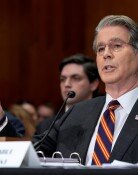[Editorial] Failed Hyundai Construction reflects the government's failure as well
[Editorial] Failed Hyundai Construction reflects the government's failure as well
Posted October. 31, 2000 21:05,
Despite the four times of self-rescue plans, the troubled Hyundai Engineering and Construction, which even led to the government's change of economic team, came to meet the worst possible circumstances: the company's check bounced for the first time Tuesday. It may sustain itself for the time-being, but its future prospects appear very bleak since the short-term loans it has to redeem during November and December are known to be over two trillion won. We think that the government's policy failures and Hyundai's management failures were the fundamental causes for the failures of the country's number one contractor.
The troubles for the cash-strapped HEC became apparent since May. Whenever the firm met critical periods of financial crisis, however, Chung Mong-Hun, its controlling shareholder, opted to stay overseas abandoning the very business fields and scenes here in Korea. We do not know whether Chung has more urgent business to attend to overseas. Chung is still staying abroad despite the fact that the firm is besieged by piles of mountainous problems, and that his presence is a must for their resolution.
In retrospect, the crisis of the HEC was anticipated as something doomed to come when Chung Ju-Yung, the firm's founder and patriarch, decided to run for the Presidential election in 1992. His business successors would have learnt what the elder Chung did: unrestricted appropriation of the corporation's money for his political campaigns as if it is his private fund.
In addition, Hyundai has not taken any positive steps for its structural reforms. But, it was overly enthusiastic for its North Korea projects as though it is staking its business fate on them. The projects require continuous cash inflow and input. This is one of the major reasons for the firm's present crisis. We are, in fact, rather curious about Hyundai's excessive indulgence in the north-bound business.
In particular, the so-called ``war of Hyundai princes,'' the junior Chungs fight over the family fortune, showcased Hyundai's feudalistic business ownership and management. The worldly exposure of Hyundai's such pre-modern business structures has resulted in the lowering of its credit ratings.
It is not a mere coincidence that HEC's cash-shortages were beginning to show precisely at that time.
On the other hand, the government must also share part of the blame.
The government has been loquacious about its commitment to structural reform over the last two years, but it virtually neglected Hyundai's structural reforms although Hyundai is a representative case of debt-ridden, ailing companies. The government's negligence here can, thus, be viewed as contributory to the sense of misgivings and uncertainties the people have over our economy.
It should be pointed out here that the Daewoo crisis represents only a very recent case. Does this mean that the government has already forgotten Daewoo's lesson as to make no efforts against a recurrence of such a case? The government's supervision over Hyundai has turned out to be lamentably loose and lax, although Hyundai was experiencing a liquidity crunch in the capital markets from several months ago. Should this have anything to do with the considerations about inter-Korean affairs? It will be economical for the government to give up any lingering attachment to such thoughts.







